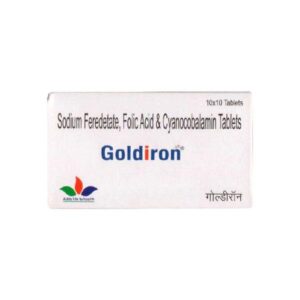FOLIC ACID + VITAMIN B12 (CYANOCOBALAMIN) + SODIUM FEREDETATE
Folic Acid: Folic acid, also known as vitamin B9, is a water-soluble vitamin that is essential for the synthesis and repair of DNA and the production of red blood cells. It is widely used as a dietary supplement and medication.
Folic acid is primarily used to treat and prevent folate deficiency, which can lead to megaloblastic anemia. It is also prescribed to pregnant women to prevent certain birth defects in the baby’s brain and spine, such as neural tube defects. Additionally, folic acid may be utilized in the treatment of certain types of anemia, as a supplement in malabsorption syndromes, and to reduce the risk of cardiovascular disease and stroke.
The mechanism of action of folic acid involves its conversion to its active form, 5-methyltetrahydrofolate (5-MTHF), inside the body. 5-MTHF acts as a coenzyme in various metabolic reactions, including the synthesis of nucleotides and the conversion of homocysteine to methionine. These processes are vital for proper cell division, DNA synthesis, and protein synthesis.
The recommended daily dose of folic acid varies depending on the age, sex, and specific health condition of an individual. For most adults, the recommended daily intake is 400 micrograms (mcg). Pregnant women are often prescribed higher doses, typically around 600-800 mcg per day.
Folic acid is generally considered safe and well-tolerated. However, like any medication, it can cause side effects in some individuals. Common side effects include nausea, bloating, gas, and a bitter taste in the mouth. These side effects are usually mild and temporary.
In rare cases, allergic reactions to folic acid may occur, resulting in symptoms such as rash, itching, swelling, dizziness, or trouble breathing. If any severe or persistent side effects are experienced, it is recommended to consult a healthcare professional.
It is worth noting that folic acid supplementation may mask vitamin B12 deficiency, and, if used in high doses, can potentially exacerbate neurological symptoms in individuals with undiagnosed vitamin B12 deficiency. Therefore, it is important to ensure sufficient vitamin B12 intake when taking folic acid supplements, especially for individuals at risk of vitamin B12 deficiency.
Vitamin B12 (cyanocobalamin): Vitamin B12, also known as cyanocobalamin, is a water-soluble vitamin that is essential for the functioning of the nervous system, the production of red blood cells, and the synthesis of DNA. It is primarily used to treat or prevent vitamin B12 deficiency, which can occur due to certain medical conditions or dietary restrictions.
The mechanism of action of vitamin B12 involves its role as a cofactor in various enzymatic reactions. It plays a crucial role in the conversion of methylmalonyl-CoA to succinyl-CoA, as well as in the conversion of homocysteine to methionine. These reactions are vital for the proper functioning of the nervous system and the production of DNA.
Vitamin B12 can be administered via injection or oral tablets. The dosage depends on the specific condition being treated and can range from 50 micrograms to 1000 micrograms. Commonly, it is administered as a 1000 micrograms injection once a month for vitamin B12 deficiency.
While vitamin B12 is generally safe and well-tolerated, it can cause some side effects. Common side effects include diarrhea, nausea, or a feeling of being swollen or bloated. In rare cases, allergic reactions such as itching, rash, or difficulty breathing can occur. It is important to consult a healthcare professional before starting vitamin B12 supplementation to ensure proper dosing and to monitor for any potential adverse effects.
Sodium Feredetate: Sodium Feredetate is an iron supplement medication used to treat iron deficiency anemia, a condition characterized by low levels of red blood cells due to insufficient iron in the body. Iron deficiency anemia can lead to symptoms such as fatigue, weakness, shortness of breath, and pale skin.
The mechanism of action of Sodium Feredetate is by replenishing the iron stores in the body. Iron is an essential component of hemoglobin, a protein in red blood cells that carries oxygen from the lungs to the rest of the body. Sodium Feredetate provides elemental iron, which is necessary for the production of new red blood cells and the maintenance of normal iron levels.
The dose of Sodium Feredetate depends on the severity of the iron deficiency anemia and the individual patient’s needs. Typically, the recommended adult dose is 550 mg (1 tablet) taken once or twice daily. It is important to follow the instructions provided by the healthcare provider or found on the medication label.
As with any medication, Sodium Feredetate can have side effects. Common side effects may include gastrointestinal issues such as constipation, diarrhea, nausea, and stomach cramps. These side effects are usually mild and temporary. In rare cases, Sodium Feredetate may cause allergic reactions, which can manifest as hives, rash, swelling, dizziness, or difficulty breathing. It is important to consult with a healthcare professional if any unusual or severe side effects occur.
It is crucial to note that Sodium Feredetate should be taken under the guidance of a healthcare professional, as iron overload can be harmful. This medication should not be used in individuals with conditions such as hemochromatosis (excess iron storage) or certain types of anemia without medical supervision. Additionally, Sodium Feredetate may interact with other medications, so it is important to inform the healthcare provider about all the medications being taken.

